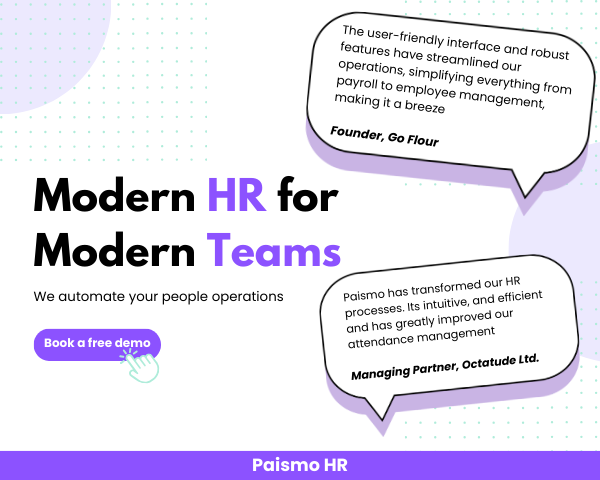Highlights
- Fractional HR offers flexible, part-time support tailored to growing businesses without full-time hiring costs.
- It differs from outsourced HR in that it focuses on strategic leadership and cultural alignment rather than task-based execution.
- Businesses gain on-demand access to seasoned HR experts for compliance, hiring, audits, or change management.
- Fractional HR helps companies stay agile, compliant, and aligned with HRMS tools and Gen Z needs.
Hiring full-time HR help isn’t always the best fit, especially for growing businesses or lean teams. That’s where fractional HR comes in. It offers flexible, on-demand support without the cost of a full-time hire. A fractional HR consultant can step in if you need help with compliance, hiring, or HR strategy.
In this article, we’ll explain how fractional HR works, when it makes sense, and whether it’s a cost-effective choice for your business. Let’s break it down step by step.
What is Fractional HR?
Fractional HR is a flexible way to get expert HR support without needing full-time hires. Ideal for small to mid-sized companies, this model allows businesses to bring in experienced professionals on a part-time or project basis. When paired with the right HRMS and modern HR software in Pakistan, it becomes a cost-effective, scalable solution that supports everything from recruitment to compliance on your terms.
How Fractional HR Works?
Fractional HR offers a practical and adaptable solution for companies that don’t need or aren’t ready for a full-time HR team. Instead, experienced professionals provide targeted support on a part-time or project basis. This approach is ideal for growing businesses that want to improve operations, stay compliant, and build stronger teams while staying cost-conscious.
So, what does this look like in practice? Let’s examine how fractional HR happens in a growing business.
1. Initial Meeting
Startups with a simple, practical conversation. The consultant listens to what’s working and what’s not, whether it's hiring delays, unclear HR policies, or compliance worries. From there, they help you pinpoint what needs attention, using today’s HR trends to guide the next steps.
2. Business Assessment
After the initial consultation, the consultant will closely examine your current HR setup. This includes reviewing existing policies, compliance risks, hiring flows, and team dynamics. The goal isn’t just to spot gaps, it’s to understand how your people operations support (or stall) small business growth. For teams that need quick, flexible guidance, platforms like Paismo HR make it easier to find the right-fit support without committing to a full-time hire.
3. Implementation and Team Integration
Once there’s a clear plan, the consultant starts working alongside your team. This might mean adjusting HR processes, helping with onboarding, or offering leadership support. As they go, they apply real-world enterprise experience to shape practical solutions that fit your goals, both now and down the road.
4. Follow-Up and Transition
The consultant doesn’t just walk away when the key objectives are met. They’ll either stay involved with light-touch support or give your internal team a clear, practical roadmap. This way, the improvements stick, and your HR processes remain smooth, sustainable, and easy to manage long after the engagement ends.
Ultimately, fractional HR gives your organization access to high-level support, just when needed, keeping your HR functions sharp, compliant, and ready to grow.
Is Fractional HR the Same as Outsourcing?
No, while both offer flexible HR support without hiring full-time staff, fractional HR and outsourced HR serve different functions, and choosing the right one depends on your company’s current needs, growth stage, and internal capabilities.
On one hand, fractional HR feels like adding a part-time leader to your team. On the other hand, outsourced HR operates more like an external service provider. Understanding this difference is key to getting it right if you explore tools like HR automation or building systems that align with Gen Z work styles. To make things more straightforward, here’s a side-by-side comparison:
Key Differences Between Fractional HR and Outsourced HR
Here’s a clear comparison to help you evaluate which service model best fits your organization’s HR needs.
| Aspect | Fractional HR | Outsourced HR |
Team Relationship | Works as a part-time team member, embedded in your organization | Functions externally, often with little day-to-day company presence |
Approach | Strategic, long-term planning and leadership support | Task-focused, mainly handles administrative or transactional HR functions |
Integration | Deep understanding of company culture and team dynamics | May work with multiple clients, less focused on individual company culture |
Typical Use Case | Growth-stage companies need flexible but high-level HR leadership | Companies looking to outsource payroll, benefits, or HR compliance |
Work Style | Flexible: remote, on-site, or hybrid | Typically, remote or off-site, standardized processes |
Focus Areas | Strategic planning, compliance, and culture development | Payroll, benefits, documentation, and onboarding logistics |
Relationship Type | Collaborative and advisory | Transactional and operational |
What are the Benefits of Fractional HR?
Fractional HR offers growing businesses a more innovative way to manage HR without hiring full-time staff. It’s flexible, practical, and tailored to what you need, when you need it.
1. Flexible to Your Business Needs
You can scale HR support up or down depending on your business cycle. Whether you’re hiring, restructuring, or navigating transitions, services adapt accordingly. This agility keeps your HR aligned with real-time needs.
2. Budget-Friendly
Hiring full-time HR talent isn't realistic for many small businesses. That’s where fractional HR becomes a smart financial move. You only pay for the services you need, when you need them, saving significantly on salaries, benefits, and ongoing overhead.
3. Access to Real Experience
One of the strongest benefits of fractional HR is the quality of expertise you gain access to. These professionals often come with years of multi-industry experience. Instead of trial and error, they bring practical strategies that have already worked elsewhere, allowing you to move faster and more confidently.
4. Targeted Help When You Need It
Whether compliance, conflict resolution, or documentation, fractional HR fills skill gaps. You get focused support without long-term commitments, making it ideal for handling urgent or complex tasks.
5. Fresh Perspective
Sometimes, internal teams are too close to the problem to see it. Fractional HR provides a fresh, unbiased view of your current HR processes. This perspective helps you discover inefficiencies and gaps you may have missed, allowing you to make more informed decisions.
6. Reduced Risk
Fractional HR professionals ensure your practices align with legal requirements. They help you avoid costly fines, lawsuits, or compliance failures. Their audits and policy reviews strengthen your protection.
7. Quick to Implement
Fractional HR can jump in fast, unlike a full-time hire, which can take weeks to recruit and onboard. Whether it's a staffing shortage, a policy emergency, or a growth period, they can start adding value immediately, saving you time when it matters most.
Whether growing fast or dealing with change, fractional HR delivers smart support without long-term costs. It’s a practical choice that helps you stay compliant, agile, and focused on what matters most.
When Should You Consider Fractional HR Services?
Knowing the right time to bring in fractional HR services can make a real difference in how your team manages growth and operations. Whether running lean or dealing with change, this approach provides tailored HR support when needed. Below are a few situations where this service works exceptionally well:
1. When Internal Resources Are Limited
Sometimes, small businesses or startups don’t have the budget or workload for a full-time HR hire. A fractional HR generalist can support essential tasks like hiring, onboarding, and employee relations, without stretching internal resources.
2. During Shifts in HR Demand
As business cycles change, so do HR needs. If your company experiences busy periods such as large recruitment drives or internal restructuring, fractional HR allows you to scale support only when needed without locking into fixed staffing costs.
3. For Task-Specific Support
There are moments when your in-house team may not have the expertise to handle complex issues like policy development, conflict resolution, or compliance reviews. In such cases, hiring a consultant for targeted HR services can solve the issue quickly and efficiently.
4. When Managing Business Growth
HR needs often become more complex if you're expanding, hiring new roles, or entering new markets. A consultant can guide your team through transitions, implement needed systems, and maintain smooth workflows while internal focus stays on business goals.
5. To Stay Aligned with Legal Changes
Regulatory changes happen regularly, and falling behind can put your business at risk. A consultant can review your terms of service, update internal policies, and help your team stay aligned with current employment laws and practices.
Once these challenges are addressed, fractional support can wrap up smoothly, leaving your business more organized and prepared for what's ahead.
Summary
Managing HR doesn’t always mean hiring full-time; it’s often about finding the proper support at the right time. Fractional HR allows growing businesses to bring in real expertise without the long-term commitment. Whether working through change or planning for what’s next, this approach helps you stay focused, confident, and in control.
FAQ
What is Fractional HR?
Fractional HR means hiring experienced HR professionals on a part-time or project basis instead of full-time. It’s a flexible way to get expert support when you need it without the cost of a full hire. It's ideal for growing teams or short-term needs.
Become a part of the Paismo community
Paismo is an HR software that can help simplify your HR operations. In today's dynamic economic environment, efficient HR and automated payroll management are no longer a luxury but a necessity. Paismo is a comprehensive solution that transforms traditional HR complexes into streamlined and automated workflows. Paismo and its paired biometric device integration can be used for your business to mark employee attendance and record their timesheets accurately.
Paismo simplifies your tasks with its core HRMS, timesheets, and attendance management, as well as biometric attendance, payroll automation, and leave management system.
Take the first step toward modernizing your HR and payroll processes and explore what Paismo can do for you. Book a demo with our sales team.











